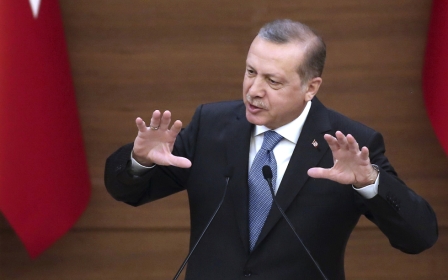Erdogan urges vote on Turkish presidential powers day after PM quits

Turkey's President Recep Tayyip Erdogan on Friday urged a rapid switch to a presidential system, a day after his prime minister announced he was quitting.
Erdogan said a referendum should be held as soon as possible to change the constitution to make Turkey stronger and more stable.
His comments came a day after Ahmet Davutoglu announced he was stepping down as prime minister, amid a reported rift with the president over a range of issues including a presidential system.
Critics fear that the reforms would concentrate too much power in Erdogan's hands.
The president meanwhile said Turkey would not change its anti-terrorism legislation for the sake of visa-free travel to Europe for its citizens.
Erdogan said: "We'll go our way, you go yours."
Davutoglu had negotiated the deal.
The EU wants Turkey to revise its terrorism laws, which carry a broad definition of "terrorism", as a condition for allowing Turks to travel to Europe without visas on short stays.
"Why aren't you changing your mindset when you allowed terrorists who put up tents close to the EU Parliament?" Erdogan said, in an apparent reference to tents set up by Kurdish activists near the EU Council building in Brussels in March.
The president added that it was "natural" he was involved in Turkey's domestic politics, despite the presidency being traditionally apolitical.
"Some are disturbed by me monitoring closely the developments related to the party... What can be more natural than this?" the president, who is supposed to be apolitical, said in a speech in Istanbul.
Stay informed with MEE's newsletters
Sign up to get the latest alerts, insights and analysis, starting with Turkey Unpacked
Middle East Eye delivers independent and unrivalled coverage and analysis of the Middle East, North Africa and beyond. To learn more about republishing this content and the associated fees, please fill out this form. More about MEE can be found here.




